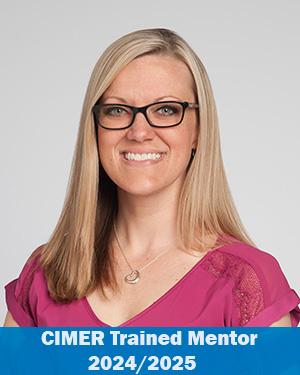Research News
01/23/2024
Mentorship guides research technician’s journey to PhD
New PhD graduate, Dr. Brandon Smith, and his mentor, Dr. Jessica Williams, discuss mentorship, creative problem-solving and communication in career development.

Five years after Jessica Williams, PhD, hired her first technician, Brandon Smith, she watched him graduate with his doctorate from Cleveland State University.
Dr. Smith had always wanted to pursue a scientific career, but his time in the Williams lab re-inspired him to earn his PhD and propelled him to his dissertation. When he joined the lab, Dr. Smith gained a mentor and joined a community of leaders and professionals educated by Cleveland Clinic.
"I was sold on research from the moment I had a pipette in my hands," Dr. Smith says. "Joining Dr. Williams's lab rekindled my love of science, and she made me feel like obtaining my PhD was possible."
"We began designing experiments together when Dr. Smith was a technician," Dr. Williams says. "One day I just said, 'You should do this! You should get your PhD!'"
In the picture above, Drs. Smith and Williams celebrate graduation with Meredith Bond, PhD, CSU's Vice President for Research and Innovation and Crystal Weyman, PhD, chair for CSU's Department of Biological, Geological and Environmental Science. Both previously worked at Cleveland Clinic.
Dr. Williams gained one of her first in-lab mentoring opportunities with Dr. Smith. She views mentorship as a key piece of her role as a leader at Cleveland Clinic's Lerner Research Institute.
Drs. Smith and Williams shared their experience of Dr. Smith's journey to his PhD, and how it changed them both as scientists.

Dr. Smith is the first PhD graduate you've had in your lab. How did you approach mentoring him?
Dr. Williams: I like talking to people and one of my favorite topics is science. By being a mentor, I get to talk to people about sciences all day. In saying that, I think having people you interact with well is so important in effective mentoring – an open line of communication helps achieve the best outcomes for both the trainee and research.
I helped Brandon transition from a technician to a PhD student, which can be tough. When you're a technician, the implication is that you're a pair of hands that's thinking through the project with someone. When you're earning your PhD, you are guiding the project; you are responsible for asking the question and eventually providing the answer.
Dr. Smith, how did Dr. Williams's encouragement and mentorship help you make that transition?
Dr. Smith: As a student, it can be tempting to try and produce as many results as possible, but a PhD is a marathon, not a sprint. Having her guide me was helpful in learning how to develop and perform experiments that ultimately lead to publication. She also helped me to write scientifically and refocus my research areas, knowing I'd obtain better results with a sustainable number of experiments.
Dr. Williams: We started designing experiments together and as we began planning them, we would run into complications. Most people would stop there and say, "This didn't work." But Dr. Smith always came in and said, "This didn't work, but this is what I think we should try next." He had an incredible intuition to troubleshoot on his own.
How did this creative collaboration further the Williams lab's work?
Dr. Williams: Our lab is going against the grain by saying inflammation can have a protective role in a cell when it's traditionally thought to be destructive. While pursuing my first R01 grant, I drew a graph that represented proving my hypothesis.
Years later, Dr. Smith became the person that performed the experiments to prove it. Dr. Smith constantly pushed past obstacles he encountered, and I could see the graph begin to look like the one I had drawn before research began – in real time.
Dr. Williams, what advice would you give to other mentors?
Dr. Williams: Part of being a leader and mentor is trusting people to contribute their own perspective to make progress. When you start a lab, it's tempting to fill those seats as quickly as possible so you can get the research going. But you must be patient and hire the right people. You spend a lot of time with your mentees, so it's best to choose someone you know you can communicate with, trust and support to reach everyone's final goal.
Dr. Smith, outside of Dr. Williams, who else supported your journey?
Dr. Smith: Other PIs outside of Dr. Williams helped me along the way, including Dr. Meredith Bond. Dr. Bond brought the T32 grant to Dr. Williams's attention that has funded my research for the last two years.
I feel support from our research community every day. Cleveland Clinic has this unique ability to collaborate across disciplines, and that means you get to see how other people's labs work, how they do things differently and how those methods may influence your own work.
Featured Experts
News Category
Related News
Research areas
Want To Support Ground-Breaking Research at Cleveland Clinic?
Discover how you can help Cleveland Clinic save lives and continue to lead the transformation of healthcare.
Give to Cleveland Clinic